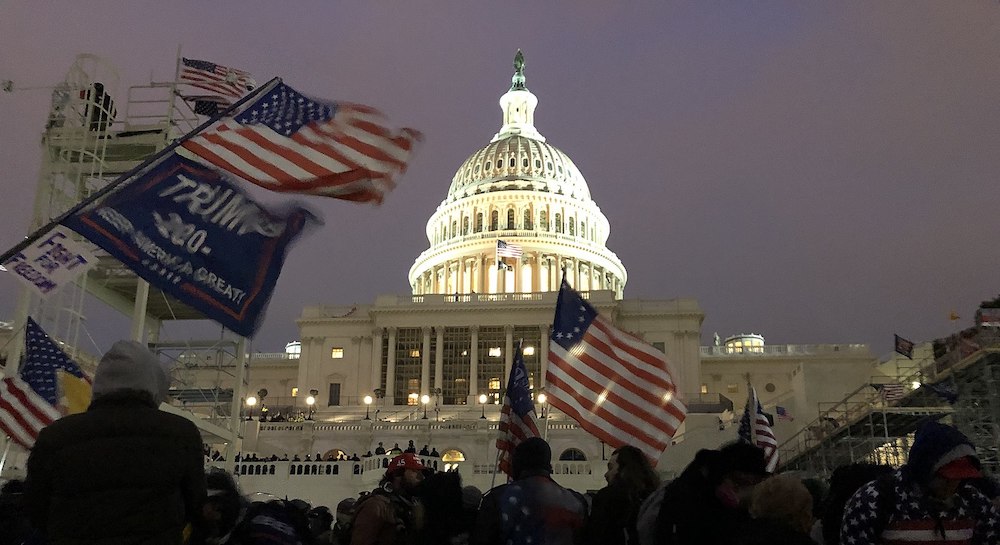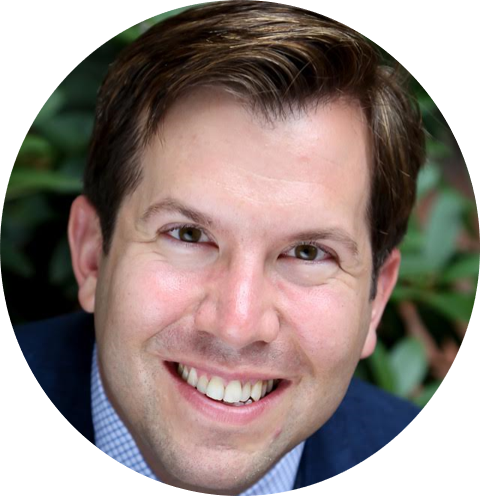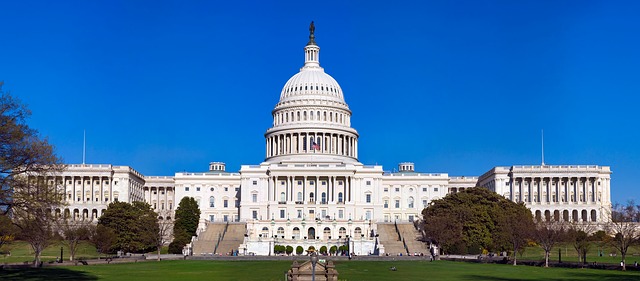
Not an Act of Religious Freedom
Patrick Hornbeck
Storming of the United States Capitol on 6 January 2021 by Tyler Merbler. (CC BY 2.0).
This article is part of our “Chaos at the Capitol: Law and Religion Perspectives on Democracy’s Dark Day” series.
If you’d like to check out other articles in this series, click here.
In the days after the horrific insurrection at the U.S. Capitol, at least some participants are being brought to justice. Grievous miscalculations by the Capitol police and other law enforcement agencies left the seat of government poorly defended, failing to prevent a riot that left five dead, dozens injured, and American democracy shaken to its core.
As of Thursday morning, the U.S. Attorney for the District of Columbia and the F.B.I. have announced charges against 30 defendants — a miniscule proportion of those who took part. One can only hope that more arrests and indictments will follow.
Here’s a question both painful and necessary to ask: What if part of these defendants’ legal strategy is to claim they were acting for religious reasons?
The “Jericho March,” and Other Religious Imagery
We must not avert our eyes from the religious rhetoric of the insurrection. Rioters carried flags proclaiming “Jesus Saves” and “Jesus 2020,” the latter mimicking the graphic design of Trump campaign paraphernalia. Some members of the mob raised a large wooden cross near the Capitol and knelt to pray before breaching the security barrier. Another left a sign announcing that “Pelosi is Satan” on the hood of a police vehicle. As Kimberly Winston reported, other religious symbols on display during the riot were the ecumenical Christian flag, banners with the ichthys symbol, and flags with such messages as “Make America Godly Again” and “An Appeal to Heaven.” One invader was identified in jail booking records as having tattoos including “God”, “wings”, and “cross”. And, dubbing the event the “Jericho March,” some of the insurrectionists equipped themselves with shofars — the better “to banish the ‘darkness of election fraud’ and ensure that ‘the walls of corruption crumble.’”
Commentators were quick to connect these religious symbols with reprehensible doctrines of Christian supremacy and, in turn, white supremacy. As Robert P. Jones, author of White Too Long: The Legacy of White Supremacy in American Christianity, put it, the Capitol witnessed an “unholy amalgamation of white supremacy and Christianity.” My Fordham University colleague Bryan Massingale called the insurrection “the inevitable consequence of the nation’s tolerance of white racism.”
Across the faith spectrum, most religious leaders roundly and rightly condemned the violence. Russell Moore, a Southern Baptist leader, named the invasion of the Capitol “a moral abomination incited by the president.” Cardinal Blase Cupich of Chicago said what happened “should shock the conscience of any patriotic American and any faithful Catholic.” Bishop Mariann Edgar Budde of the Episcopal Diocese of Washington, was equally forthright: “To those who see this as a Christian endeavor, or something to be blessed in the name of Jesus, there is nothing Christian about what we are witnessing today. Nothing.”
Yet a minority equivocated. NPR reported that a California pastor who attended President Trump’s rally at the Ellipse but did not participate in the assault on the Capitol said that “[t]his is what you get when you eject God from the courts and from the schools.”
Some Reminders about RFRA
And so it is not entirely beyond imagining that, faced with charges that will likely range from violent entry, disorderly conduct, and the destruction of federal property all the way up to felony murder, some of the Capitol insurrectionists will claim that religion is among the motivations for their actions.
They may well invoke the protections of the Religious Freedom Restoration Act (RFRA), a federal statute enacted in 1993 that sought to remedy what political leaders of the day thought was the Supreme Court’s mistaken decision in a case about the religious use of peyote by members of the Native American Church. In Employment Division v. Smith (1990), which the Court might overrule this Term, the Court held that neutral, generally applicable laws may constitutionally burden the free exercise of religion.
As I have noted elsewhere in these pages, politicians and commentators greeted Smith with dismay and anger. They blasted Justice Scalia, who wrote the Court’s opinion, for “judicial activism,” and within days of the ruling, legislators began laying plans to overturn it by statute. The roster of those who advocated for RFRA may surprise us today. The first version of the statute introduced in the Senate was co-sponsored by Joseph R. Biden, Jr., and Orrin G. Hatch, along with six other senators. A subsequent version was introduced by Edward M. Kennedy, and the bill that finally passed the House of Representatives had as its chief sponsor Charles Schumer. The final votes were 97–3 in the Senate and unanimous in the House. (Carolyn N. Long has compiled a remarkable legislative history of RFRA in her excellent book on Smith.)
How does RFRA, now codified at 42 U.S.C. § 2000bb, work? It provides that “[g]overnment may substantially burden a person’s exercise of religion only if” the government is acting in pursuit of a compelling interest and the means the government has chosen is the least restrictive way to do so. Acting as what some have called a super-statute, RFRA mandates that courts apply strict scrutiny when a litigant claims that a generally applicable law is limiting her religious freedom.
RFRA claims have proliferated in recent years. The Supreme Court wielded the statute in 2012 to require that the government exempt Hobby Lobby and other closely held corporations whose owners possess strong religious beliefs from the Affordable Care Act’s requirements concerning insurance for contraception. Just last month, in an opinion by Justice Thomas, a unanimous Court (Justice Barrett sitting out) held that individuals who prevail on their RFRA claims can obtain money damages when they sue federal officials in their individual capacities.
RFRA and the Capitol Insurrectionists
But courts have every reason to be unsympathetic if members of the mob who assaulted the Capitol last week raise RFRA defenses. Both the text of the statute and recent precedent are clearly against them.
The first hurdle these defendants would have to overcome would be to demonstrate that their actions at the Capitol were part of their religious practice. This may actually be the easiest showing for them to make, as courts have tended not to ask more than whether litigants’ assertions about their religious beliefs or practices are sincere. Sadly, as the signs the rioters carried made plain, some of them may indeed have been impelled by a twisted combination of religious and political fervor. Because the trend among courts has been to avoid preemptively the constitutional problems that might arise from delving too deeply into the particulars of a litigant’s faith, the rioters would likely be able to establish that the laws under which they were being charged burdened their religious exercise.
Even under RFRA’s generous standard, religious exercise alone is not sufficient to justify an exemption from generally applicable laws.
Yet, it must be stressed, that is not the end of the inquiry. Even under RFRA’s generous standard, religious exercise alone is not sufficient to justify an exemption from generally applicable laws — including, in the context of last week’s insurrection, laws against disorderly conduct, vandalism, assault, and homicide. The government still prevails if it can demonstrate that the relevant laws, as applied to the religious believer, further a compelling government interest and are the government’s least restrictive alternative. Both of these are easy showings here. What federal interest could be more compelling than the physical security of the seat of government during the proceeding that confirms the Electoral College’s vote for the next chief executive? And how could that interest be pursued by any means narrower than enforcing laws against violence and disorder against everyone who violates them?
Courts should need no further reasons to entertain RFRA defenses on the part of the Capitol rioters. But if there is any temptation to do so, it is worth remembering that a year and a half ago, a federal judge denied a RFRA defense to protestors whose actions were far more peaceful than those of the insurrectionists.
In 2018, seven members of the Kings Bay Plowshares, a Catholic peace organization, broke into a nuclear submarine base in Georgia. They carried out what they called “sacramental action,” using hammers, crime scene tape, and banners to protest the use of nuclear weapons. Arrested for destruction of property, trespass, and conspiracy, among other federal crimes, the Plowshares members sought the protections of RFRA. U.S. District Judge Lisa Godbey Wood rejected their claim, holding in U.S. v. Kelly that while the statutes under which they were charged did burden the Plowshares’ sincere religious exercise, the government’s interest in the security of a military base housing nuclear weapons was clearly compelling. Enforcing the law against the Plowshares was the least restrictive approach, Judge Wood wrote, since “[t]he only other alternative is . . . to exempt Defendants from [the law] for their actions on that night but such an alternative does not permit the government to achieve its compelling interest to any degree—let alone to the same degree.” A jury found all the Plowshares guilty.
Judge Wood’s logic applies with equal or greater force to those who attacked the Capitol. As we are continuing to learn, some of those who breached the building intended to overturn the results of a national election, as well as to visit deadly violence on the Vice President and congressional leaders. The means they chose put hundreds in harm’s way, including the Capitol Police officer who lost his life defending the institutions of democracy. They left behind them shattered windows, upended offices, and psychological terror. The Plowshares did none of these things, making their opposition to nuclear weapons known nonviolently and submitting peaceably to arrest when confronted. If they cannot claim the protections of RFRA, then it is unthinkable that those who employed or threatened violence in order to disrupt a core democratic function should be able to do so.
Unthinkable?
Some may wonder whether the argument I have been making is even necessary. Isn’t it just beyond the pale to imagine a Capitol insurrectionist attempting a RFRA defense?
Would that it be so, and indeed, we have yet to hear religious claims from the few members of the mob who have been arrested or who have offered public apologies. (One told a local television station that he “got caught up in the moment.”)
But there are two reasons why we need to be clear from the outset that no religious belief can justify or excuse what the insurrectionists did last week.
One is that religious freedom has sometimes been uncritically fetishized among some of those who have supported the policies of the outgoing administration. Some have argued, for instance, that bans on religious gatherings during the COVID-19 pandemic are unconstitutional. It should go without saying that the framers of U.S. democracy rightly protected religion and its exercise in the opening clauses of the First Amendment, but they never intended that religious faith be an absolute legal immunity for those who practice it, no matter how fervently or sincerely. Jefferson, for instance, wrote in Virginia’s statute concerning religious freedom that government officers may “interfere” with religion “when principles break out into overt acts against peace and good order.”
In the wake of Wednesday’s violence, we must be clear that religious freedom has limits.
Courts, advocates, and commentators are currently in the midst of an important debate about how far religious exemptions should extend, but in the wake of Wednesday’s violence, we must be clear that religious freedom has limits.
The second reason is that the insurrectionists are likely to be legally desperate. Their actions amply documented in images and videos (many of which they themselves posted online), it will be difficult for many of those who stormed the Capitol to deny what they did. Their attorneys will likely be looking for affirmative defenses, and in some cases, the religious symbols their clients carried may be among the few legal lifelines they can clutch.
Many observers of U.S. Christianity have commented that the assault on the Capitol exposed more clearly than ever the dark alliance President Trump and politicians who support him have forged with those who advocate white supremacy and Christian nationalism. As the nation enters a long-overdue period of reckoning, the judicial system must do its part to ensure that violence and extremism not be excused when they march under a religious flag. ♦

Patrick Hornbeck is professor of theology at Fordham University, where he is also a J.D. student in the School of Law. A historian of Christianity who presently works at the intersection of U.S. religion and law, Hornbeck is author or editor of eight scholarly books, most recently Remembering Wolsey: A History of Commemorations and Representations (Fordham University Press, 2019).
Recommended Citation
Hornbeck, Patrick. “Not An Act of Religious Freedom.” Canopy Forum, January 15, 2021. https://canopyforum.org/2021/01/15/not-an-act-of-religious-freedom/.


